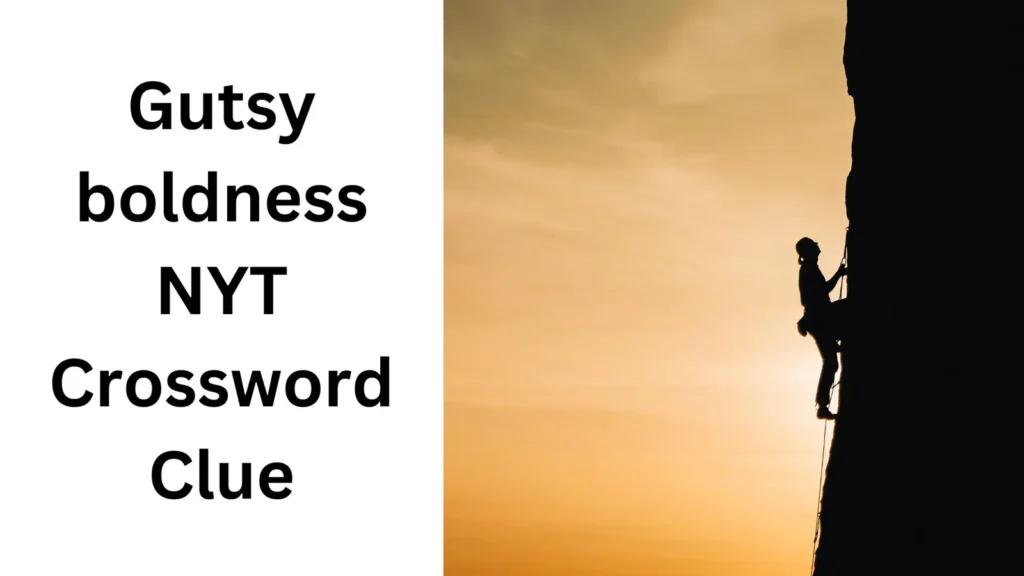
Gutsy Boldness in NYT Crossword
The New York Times crossword is an iconic feature in the world of puzzles, recognised for its smart clues, difficult grids, and the occasional head-scratcher that leaves solvers stumped. Among the diverse sorts of clues that seem within the NYT crossword, those that trace at “gutsy boldness” stand out for their capability to capture a positive spirit of daring and audacity. These clues regularly require solvers to suppose past the plain, tapping into a broader vocabulary that includes phrases and phrases emblematic of courage, threat-taking, and fearless expression. In this text, we explore the idea of gutsy boldness in the NYT crossword, the types of solutions that those clues would possibly result in, and strategies for tackling such demanding situations.
The NYT Crossword: A Legacy of Linguistic Brilliance
The New York Times crossword has been a staple of American culture given that its debut in 1942. Created through Margaret Farrar, the primary crossword editor, the puzzle quick became a liked function in the newspaper. Over the years, the NYT crossword has advanced, incorporating more present day references, numerous themes, and a variety of clue types that project solvers to think creatively and analytically.
What sets the NYT crossword apart is its commitment to incredible clues and answers that mirror not simply language, but also the zeitgeist of the times. Puzzles range from smooth to diabolically difficult, with the latter regularly providing clues that require a deep understanding of wordplay, cultural references, and lateral thinking.
Deciphering Gutsy Boldness: Common Answers
When confronted with a clue hinting at “gutsy boldness,” solvers are regularly seeking out terms that denote braveness, audacity, or a brash willingness to take risks. Here are a few common answers that suit the invoice:
MOXIE:
This time period epitomizes gutsy boldness, relating to a person who has nerve, dedication, and a spirited mind-set. Originating from a popular Nineteen Twenties soft drink, “moxie” has come to symbolize the form of boldness this is trendy in a person who doesn’t shrink back from challenges.
PLUCK:
A conventional crossword solution, “pluck” denotes lively and determined braveness. It’s a flexible word that suits neatly into a grid, often performing in puzzles that commemorate bravery and tenacity.
GRIT:
A greater modern-day synonym for gutsy boldness, “grit” is related to perseverance and the capability to face up to adversity. It’s a term that captures both bodily and intellectual fortitude, making it a becoming solution in crosswords with topics of resilience.
SPUNK:
Similar to “pluck,” “spunk” refers to lively and decided braveness. It conveys a experience of active boldness, frequently used to describe someone who stands up for themselves or faces demanding situations head-on.
CHUTZPAH:
Borrowed from Yiddish, “chutzpah” is a time period that completely encapsulates audacious boldness, regularly with a cheeky or bold flair. It describes someone who’s willing to take risks, once in a while in a way that is probably considered overconfident or impudent.
AUDACITY:
This trustworthy time period for gutsy boldness often appears in crosswords as an answer to clues that describe daring acts or fearless conduct. It’s a phrase that resonates with both superb connotations of bravery and negative connotations of nerve.
VERVE:
Verve represents energetic enthusiasm or vigour, regularly sporting with it a sense of formidable expression. It’s regularly used in crosswords to explain someone who approaches existence with a lively and gutsy attitude.
The Art of Crafting Bold Clues
Crossword constructors are artists in their own right, weaving words right into a tapestry of linguistic task and satisfaction. Crafting a clue that hints at “gutsy boldness” calls for a blend of wit, precision, and an information of language nuances. Here are a few methods constructors create those bold clues:
Double Meanings and Wordplay:
Clues that make use of double meanings or puns are a fave in the NYT crossword. For example, a clue like “Courage to go together with the flow?” should cause the answer “MOXIE,” playing at the concept of fluid motion (moxie as a drink) and lively courage.
Cultural References:
Crossword clues often draw on cultural references, the usage of famous fees, movies, books, or ancient occasions that embody the idea of boldness. A clue like “What Rosie the Riveter had lots of” may factor to “GRIT” or “MOXIE,” drawing on the enduring parent’s representation of girls’s strength and audacity throughout World War II.
Cryptic Elements:
In cryptic crosswords, that are more not unusual in British-fashion puzzles however from time to time appear in the NYT, clues may be even more convoluted, with hidden meanings and wordplay that require solvers to piece together the solution from multiple layers of interpretation.
Rebus Clues:
Sometimes, the answer to a gutsy clue may contain a rebus—in which a unmarried rectangular within the crossword grid holds a couple of letter or maybe a symbol. A clue hinting at excessive boldness would possibly creatively use a rebus to squeeze the idea into the grid in a visually or conceptually putting way.
Strategies for Solving Gutsy Clues
When you come upon a crossword clue that appears to hint at gutsy boldness, here are some strategies that will help you crack it:
Start with Cross-Checking:
Use the intersecting words within the grid in your benefit. Cross-checking letters from different answers can narrow down opportunities and provide crucial recommendations approximately the perfect term.
Think Thematically:
If the puzzle has a theme, keep in mind how the clue may suit inside that context. For instance, if the crossword theme revolves round classic cinema, a clue about gutsy boldness would possibly reference characters or films recognized for their daring.
Break Down the Clue:
Analyze the clue cautiously. If it’s a pun, take into account both the literal and figurative meanings. If it’s a sincere definition, think about synonyms that suit the range of letters required.
Stay Updated on Slang and Cultural Terms:
Modern crosswords, in particular the NYT, regularly comprise modern-day slang and idioms. Staying acquainted with cutting-edge phrases that replicate boldness or audacity can provide you with an edge in solving.
Use the Process of Elimination:
If you have got some possible solutions but aren’t sure which one suits, recall how each phrase might work with the clues you haven’t but solved. This technique of removal can often lead you to the precise solution.
The Broader Impact of Crosswords on Language and Culture
The recognition of crosswords like those within the NYT speaks to a broader cultural fascination with language and hassle-fixing. They function more than only a hobby; they are a way for people to interact with phrases, assume significantly, and hold their minds sharp. Crosswords also mirror cultural shifts, incorporating new slang, technological terms, and evolving societal norms into their grids.
Moreover, the language of crosswords regularly enters everyday speech. Terms like “crosswordese” (phrases commonly utilized in crosswords but not often in ordinary verbal exchange) highlight the specific lexicon that puzzle enthusiasts increase. Similarly, solving a crossword is regularly likened to cracking a code, reflecting the puzzle’s roots in linguistic and cognitive project.
Why We Love a Good Challenge
The NYT crossword, with its clues hinting at gutsy boldness, faucets into our inherent love for demanding situations. Solving a hard clue isn’t pretty much locating the proper word—it’s approximately the pride of conquering a linguistic puzzle, the joy of a intellectual breakthrough, and the joys of matching wits with the puzzle’s creator.
This detail of mission is a part of what makes crosswords so addictive. Whether you’re fixing a Monday puzzle (typically the easiest of the week) or a daunting Saturday grid (frequently the toughest), the system of pushing via frustration to obtain information is deeply rewarding. The clues that evoke gutsy boldness mirror this revel in, celebrating the very human traits of perseverance, threat-taking, and the courage to face the unknown.
Conclusion
In the arena of the Gutsy Boldness in NYT Crossword, clues that hint at gutsy boldness are extra than just words—they are a party of the human spirit. Whether the solution is “MOXIE,” “GRIT,” or “CHUTZPAH,” those phrases encapsulate a experience of daring that resonates with solvers on a private level. As you navigate the twists and turns of every crossword puzzle, bear in mind that each formidable solution is a nod to the audacity it takes to have interaction with life’s demanding situations, both massive and small. So, the subsequent time you see a clue for gutsy boldness, include the adventure, dig deep into your vocabulary, and permit your personal boldness manual you to the answer.







